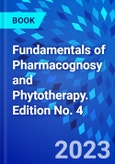Fundamentals of Pharmacognosy and Phytotherapy is a landmark textbook that covers this spectrum of medicinal plant use. Written by leading experts in this field, this book takes the reader through the history, identification, and quality assurance of plant-based medicines to their therapeutic properties, safety, and compatibility and interaction with prescribed drugs.
Aimed at students of all healthcare professions, including pharmacy, medicine, nursing and complementary therapies, the comprehensively updated information in this textbook is also relevant to those companies and organisations concerned with the regulation and testing of herbal medicines (phytomedicines), other natural health products, nutraceuticals and dietary supplements.
- Introduces the concepts and scope of pharmacognosy
- Examines the scientific evidence of plant-based medicines for a range of health conditions
- Extended and updated referencing includes recent reviews, WHO and official documents (open access where available) for quick access to further scientific literature
New to this edition
- Antimicrobial natural products: as antibiotics and antiseptics, and their potential as bacterial resistance modifiers
- Anticancer natural products: scope now includes their role in chemoprevention and associated anti-inflammatory mechanisms
- New chapter on pharmacovigilance for herbal medicines and related products
- Quality assurance and pharmacopoeial methods extended, with many new figures and examples
- Plant medicines of recent scientific interest (popularity, or notoriety) added throughout
- An enhanced eBook version is included with purchase. The eBook allows you to access all the text, figures, and references, with the ability to search, customise your content, make notes and highlights, and have content read aloud - Antimicrobial natural products: as antibiotics and antiseptics, and their potential as bacterial resistance modifiers
- Anticancer natural products: scope now includes their role in chemoprevention and associated anti-inflammatory mechanisms
- New chapter on pharmacovigilance for herbal medicines and related products
- Quality assurance and pharmacopoeial methods extended, with many new figures and examples
- Plant medicines of recent scientific interest (popularity, or notoriety) added throughout
Table of Contents
PART A Fundamentals of Pharmacognosy
SECTION 1 Pharmacognosy and Phytotherapy
1 Importance of Plants in Modern Pharmacy and Medicine
2 Pharmacognosy and Its History: People, Plants and Natural Products
SECTION 2 Medicinal Plant Sciences
3 General Principles of Botany: Morphology and Systematics
4 Plant Families Yielding Important Medicines
5 Ethnobotany and Ethnopharmacology
SECTION 3 Natural Products: An Introduction
6 Natural Product Chemistry
7 Analytical Methods for Natural Products
8 Natural Product Isolation and Structure Elucidation
9 Natural Products With Anticancer and Chemopreventive Effects
10 Antimicrobial Natural Products
SECTION 4 Herbal Medicinal Products
11 The Complex Pharmacology of Herbal Medicines
12 Production, Quality Control and Standardisation of Herbal Medicines
13 Toxicity of Herbal Constituents
14 Herbal Medicine Interactions
15 Regulation and Pharmacovigilance for Herbal Medicines
16 Plants in Traditional Medicine Systems
17 Complementary, Alternative and Integrative Plant Therapies
PART B Important Plant Medicines
18 The Gastrointestinal and Biliary System
19 The Cardiovascular System
20 Weight-Loss Supplements
21 The Respiratory System
22 The Central Nervous System
23 The Musculoskeletal System
24 Female Hormonal and Reproductive Conditions
25 The Male Reproductive System
26 Supportive Therapies for Stress, Ageing, Cancer and Debility
27 Topical Phytotherapy: Skin, Hair, Eye, Ear, Nose and Throat
ANNEX
Naming Herbal Drugs: Pharmaceutical (Latinised), Common English and Accepted Botanical Names (Binomials) and Synonyms
Index
Authors
Michael Heinrich Professor and Head of Centre for Pharmacognosy, School of Pharmacy, University of London, UK. By Michael Heinrich, Dr rer nat habil MA(WSU) Dipl. Biol. FLS, Professor of Ethnopharmacology and Pharmacognosy and Head of Centre for Pharma & Bio Chemistry, School of Pharmacy, University of London, UK Joanne Barnes Associate Professor in Herbal Medicines, School of Pharmacy, University of Auckland, New Zealand. Jos� Prieto-Garcia Lecturer in Pharmacognosy, UCL School of Pharmacy, London, UK. Jos� Prieto-Garcia, Associate Professor in Natural Products and Phytochemistry at Liverpool John Moores University, UK Simon Gibbons Professor of Natural Product Chemistry at the University of East Anglia School of Pharmacy UK Simon Gibbons, BSc MRSC CChem PhD FLS, Professor of Natural Product Chemistry at the University of East Anglia School of Pharmacy UK. Elizabeth M. Williamson Professor of Pharmacy, School of Pharmacy, University of Reading, UK; Editor-in-chief of Phytotherapy Research; Member of the Herbal Drugs Committees for The British Pharmacopoeia and The European PharmacopoeiaProfessor of Pharmacy and Director of Pharmacy Practice. Elizabeth M. Williamson, BSc(Pharm) PhD MRPharmS FLS, Emerita Professor of Pharmacy, School of Pharmacy, University of Reading, UK; former Editor-in-chief - now a Senior Editor of Phytotherapy Research; Member of the Herbal Drugs Committees for The British Pharmacopoeia








